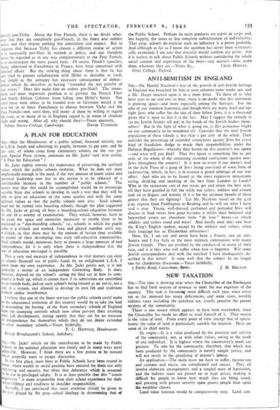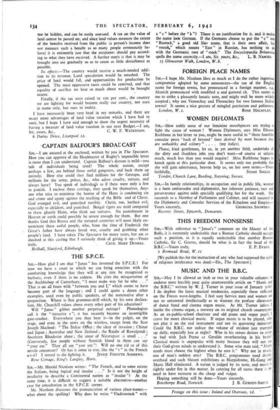NEW TAXATION
Sta,—The time is drawing near when the Chancellor of the Exchequer has to find fresh sources of revenue to meet the war expenses .of the
country. This task is becoming more difficult each year, since every tax so far imposed has many deficiencies, and some taxes, notably indirect-taxes including the purchase tax, cruelly penalise the poorer sections of the community.
There is one source which appears to have been overlooked, since the Chancellor has made no effort to avail himself of it. That source is the value of land. From every point of view (except that of specu- lators) the value of land is particularly suitable for taxation. Here are some of its chief merits.
Its origin.—It is a value produced by the presence and activity of the community, not, as with other values, owing to the work
of any individual. It is highest where the community's needs are greatest. To take for the community, therefore, that whicl has been produced by the community is merely simple justice, and will not result in the penalising of anyone's labour.
Its application.—The main taxes we have to suffer, income-tax and customs and excise, are complicated and unjust. They all involve elaborate arrangements and a tangled mass of legislation, and the indirect taxes are passed on in high prices, making it difficult for people to know how much they are being taxed, and pressing with greater severity upon poorer people than upon the wealthier classes.
Land value taxation would be comparatively easy. Land can-
not be hidden, and can be easily assessed. A tax on the value of land cannot be passed on; and since land values measure the extent of the benefits received from the public (a person's income does not measure such a benefit as so many people erroneously be- lieve) it is eminently just that the recipients should pay accord- ing to what they have received. A further merit is that it may be brought into use gradually so as to cause as little disturbance as possible. Its effects.—The country would receive a much-needed addi- tion to its revenue. Land speculation would be smashed. The price of land would fall, and opportunities for production be opened. The most oppressive taxes could be remitted, and that equality of sacrifice we hear so much about would be brought nearer.
Finally, if the tax were raised to loo per cent., the country we are fighting for would become really our country, not ours in name only, but ours in 'reality.
I have necessarily been very. brief in my remarks, and there are many more advantages of land value taxation which 1 have had to omit, but I hope I have said enough to show the urgent necessity of having a measure of land value taxation in our next Budget.—I am,



























 Previous page
Previous page